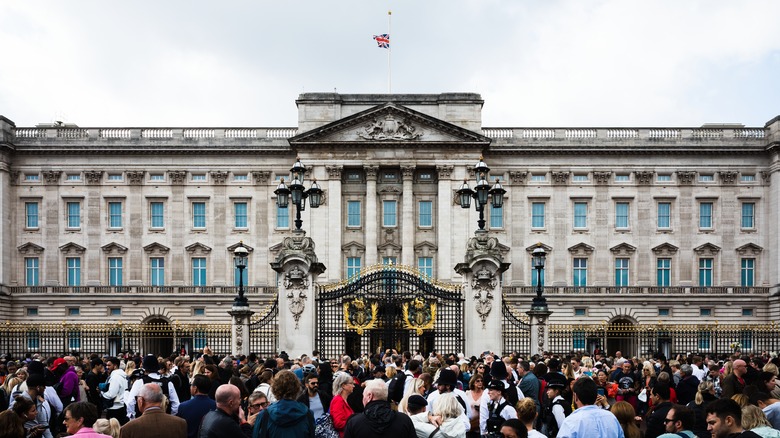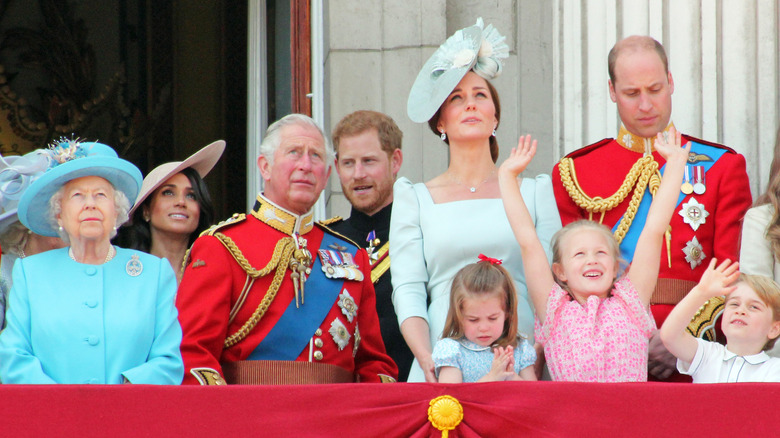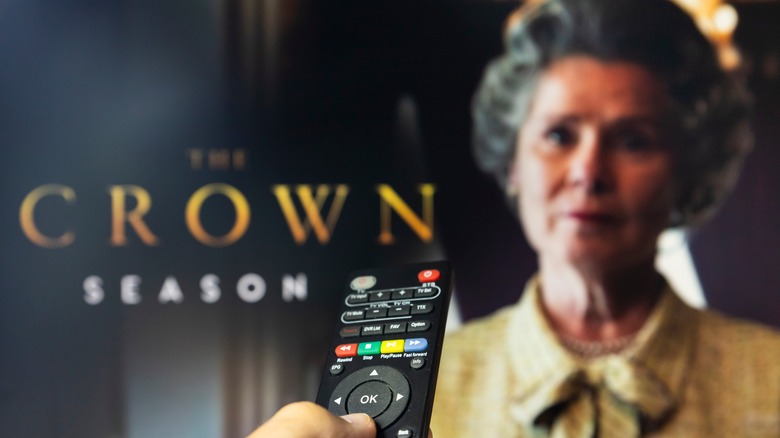Why Buckingham Palace Is Being Blamed For Scandals Surrounding The Crown
"The Crown" season 5 isn't even out yet, and it's causing drama. Thanks to some leaked plot points, some have been critical of the Netflix series and the potential for viewers to struggle to differentiate fact from fiction. One supposed plot point that's caused contention involves a conversation between King Charles III and former British prime minister John Major, suggesting that Queen Elizabeth II should abdicate the throne and put Charles in charge. A spokesperson for Major said that the series was "nothing other than damaging and malicious fiction" (via RadioTimes), while royal biographer Sally Bedell Smith added that "The Crown" was "doing significant damage to people's perception of history and their perception of the royal family" (via the Daily Mail).
In response, "The Crown's writer Peter Morgan said (via Variety) that while the 1990s, in which this series is set, was a tumultuous time for Charles, "that doesn't mean that, with the benefit of hindsight, history will be unkind to him, or the monarchy. The show certainly isn't." Netflix has since added a disclaimer to the trailer for season 5 (via YouTube), writing that the series is "inspired by real events" and is a "fictionalized dramatization."
But while the show continues to receive criticism, most recently from actress Judi Dench in a letter to the editor of The Times, who called the series "crude" and "cruel," some are blaming the Palace itself for the scandals surrounding "The Crown."
The Palace has made efforts to shield itself from the public
Philip Murphy, a historian at the University of London, replied to Judi Dench's letter in The Times defending Peter Morgan's Netflix series. He wrote that if the actress was apprehensive that viewers would believe what is being depicted on screen as accurate, "this will be partly the fault of the palace." He added that the monarchy "has made strenuous efforts to prevent historians from gaining access to records on the Queen's 70-year-reign, in particular by obtaining an absolute exemption from the Freedom of Information Act." In the UK, this act allows the public to access information from authorities like the government, National Health Service (NHS), and police forces (via the Information Commissioner's Office). "If scholars are unable to write an accurate history of the monarchy, the field will be left to dramatists and to those with vested interests in leaking information," Murphy concluded.
This is despite Buckingham Palace having an "invisible contract" with the British media (via BBC News), as Prince Harry, the Duke of Sussex told Oprah Winfrey in his and Meghan Markle, the Duchess of Sussex's interview (via YouTube). "There's a reason that these tabloids have holiday parties at the Palace," Markle said. "They're hosted by the Palace, the tabloids are. You know, there is a construct at play there."
It's hard for The Crown not to dramatise scandals within the royal family
Usually, this relationship between Buckingham Palace and the media is a valuable commodity that allows the royal family to communicate with the public and for the media to publish stories. But due to the current "tabloid age and era of gossip," Dr Laura Clancy, a media lecturer at Lancaster University, told BBC News, the alliance between the royals and the media has been thrown off balance. "The monarchy relies on a careful balance of visibility and invisibility to maintain its power, so the inner workings of monarchy must be kept invisible to protect the institution from scrutiny," Clancy said.
But as the 1990s were a turbulent era full of scandals that the royal family struggled to protect themselves from, it's hard for a series like "The Crown" not to cover these subjects — however much the monarchy would like them not to. As one source told The Telegraph, the plot points shown in the series are courtesy of the real-life drama surrounding the royals during this period and that "less unpleasant and destructive" narratives would have been told if they weren't already part of history.


